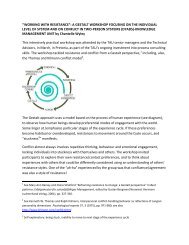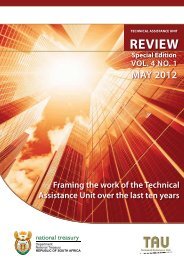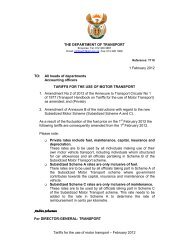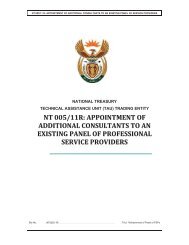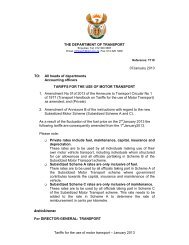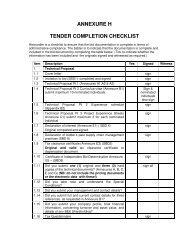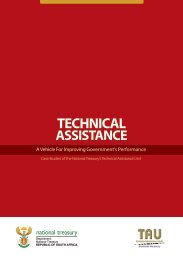Review 3 final 2 - TAU - National Treasury
Review 3 final 2 - TAU - National Treasury
Review 3 final 2 - TAU - National Treasury
Create successful ePaper yourself
Turn your PDF publications into a flip-book with our unique Google optimized e-Paper software.
TECHNICAL ASSISTANCE UNIT REVIEW | Green Governance<br />
But Resilient Cities must also be places where poverty<br />
and inequality are consciously tackled and addressed.<br />
In fact, making cities resilient, offers wide ranging<br />
opportunities for decoupling and the dematerialisation<br />
of the economy, including job creation, democratising<br />
the economy and ensuring that our economies are<br />
more robust.<br />
THE GREEN ECONOMY – CORNERSTONE OF<br />
RESILIENT CITIES AND DEMOCRACY<br />
It is this context that cities, once again, can take the lead<br />
in helping to promote the green economy. Indeed,<br />
the green economy would help build resilience and<br />
also address poverty and build local employment and<br />
job opportunities.<br />
“Local and regional governments can support private<br />
innovation by supporting the activities that follow<br />
the research and development of new environmental<br />
technologies. These activities can be summarized<br />
in four stages: demonstration, verification,<br />
commercialization, diffusion and utilization. Private<br />
R&D expenditures in green innovations might be<br />
in fact limited, given the novelty and complexity of<br />
the market for environmental products, and the<br />
associated difficulties in making new products<br />
known and properly valued. Local governments<br />
can take the forefront by promoting environmental<br />
technology verification schemes, supporting<br />
the development of marketing tools (web sites,<br />
targeted conferences, mailing lists), financing and<br />
disseminating results of demonstration tests, and<br />
removing regulatory barriers to the implementation<br />
of these technologies.” (Kamal-Chaoui, L and Alexis<br />
R (eds.) 2009: 157)<br />
It is really at the local/ regional level where many of<br />
the answers and solutions to living within our resource<br />
constraints exist and where we can draw inspiration for<br />
the future.<br />
At one level, the local level, one could argue that we<br />
already have the means and understanding to live<br />
sustainably and completely within the limits of our<br />
resources – and to do so in a manner that is comfortable<br />
and empowering.<br />
However, if we are to ensure that these processes<br />
continue to flower and evolve, we critically need to<br />
bring these solutions into the global arena – into the<br />
rhetoric of economists, politicians and industrialists.<br />
There are many positive signs. But so too are there<br />
worrying signs of a retreat by the powerful into<br />
securing their own consumption and lifestyle patterns.<br />
Given that poverty and unemployment are one of<br />
the greatest challenges facing not only South Africa,<br />
but the developing world as a whole, then the use<br />
of renewable technologies offers possibly one of the<br />
greatest opportunities to tackle these problems. The<br />
term ‘Green Economy’ has been used to describe<br />
all those components within the economy that<br />
contribute to sustainable patterns of consumption<br />
and production – be it the waste stream, energy<br />
utilisation, water management, agriculture and, of<br />
course, construction. The Green Economy subsists<br />
in all sectors of the economy and is defined not so<br />
much by it sectoral nature, but by the technology and<br />
approaches utilised to ensure sustainable utilisation of<br />
resources.<br />
Democracy<br />
The ‘Green Economy” also has other potential<br />
benefits for freedom and democracy. Alternative and<br />
renewable energy sources from wind and solar are<br />
inherently democratic in that they can be controlled<br />
and produced at the household level. Conversely,<br />
technologies such as nuclear, because of the secrecy<br />
and security around the by-products and the sensitivity<br />
of technology, are inherently undemocratic.<br />
page 41<br />
Enabling change for development



